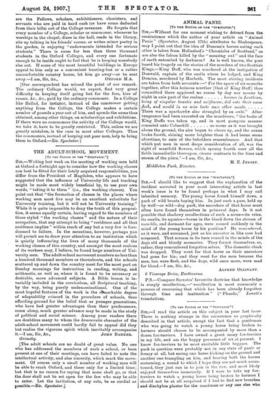ANIMAL PANIC.
[TO Till EDITOR OP THE "SPROTATOR.1 SIR,—Without for one moment wishing to detract from the omniscience which the author of your article on " Animal Panic" (Spectator, August 17th) attributes to Shakespeare, may I point out that the idea of Duncan's horses eating each other is taken from Holinshed's " Chronicles of Scotland," as are also the falcon killed by the " mousing owl " and the face of earth entombed by darkness ? As is well known, the poet based his tragedy on the stories of the murders of two Scottish Kings,—King Duff, who was murdered at the instigation of Donwald, captain of the castle where he lodged, and King Duncan, murdered by Macbeth. The most stirring incidents are taken from both accounts :—" For the space of six moneths together, after this heinous murther [that of King Duff] thus committed there appeared no sunne by day nor moons by
night in anie part of the realms horsses in Louthian, being of singular beautie and swiftnesse, did eate their owns flesh, and would in no wise taste anie other mate There was a sparhawke also strangled by an owle." After vengeance had been executed on the murderers, " the bodie of King Duffe was taken up, and in most pompous manner conueied unto Colmekill so soone as it was brought aboue the ground, the airs began to cleave up, and the sunne brake foortb, shining more brighter than it had beene seene aforetime, to anie of the beholders remembrance. And that which put men in most deeps consideration of all, was the sight of manifold flowers, which sprang foorth over all the fields immediatlie thereupon, cleaue contrarie to the time and season of the yeere."—I am, Sir, &c., Middleton Park, Bicester.
M. E. JERSEY.


































 Previous page
Previous page